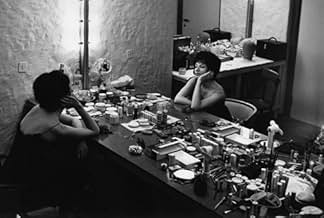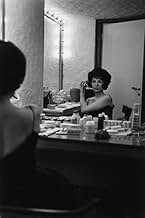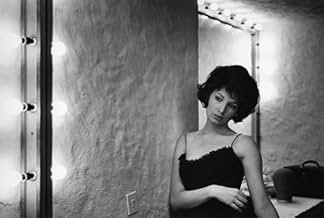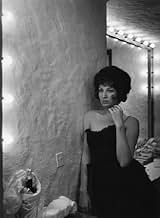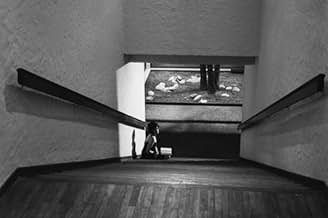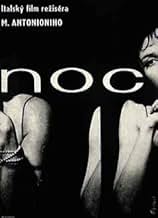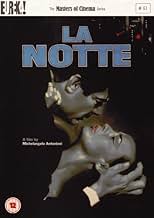Un día en la vida de un matrimonio infiel y el constante deterioro de su relación.Un día en la vida de un matrimonio infiel y el constante deterioro de su relación.Un día en la vida de un matrimonio infiel y el constante deterioro de su relación.
- Dirección
- Guionistas
- Elenco
- Premios
- 6 premios ganados y 4 nominaciones en total
- Il signor Fanti
- (as Guido Ajmone Marsan)
- Sé stesso
- (sin créditos)
- Un invitato alla festa
- (sin créditos)
- Sé stesso
- (sin créditos)
Opiniones destacadas
I don't want to get into the plot too much, but this film is more about feeling. The friction and differences between husband and wife are explored.
Antonioni doesn't force anything, he allows a scene to play out in proper time. This film is full of symbolism and despair.
As the film opens, one morning in Milano, married couple Giovanni (Marcello Mastroianni) and Lidia (Jeanne Moreau) visit their friend Tomasso (Bernhard Wicki) in the hospital as he lays dying. Lidia is clearly shaken by the experience and, after Giovanni leaves for an appearance to promote his new book, the camera tracks Lidia through a long, aimless walk around Milano as she processes her thoughts. Here Antonioni (anticipating his later film Il Deserto Rosso) shows the drastically changing face of Milano in the postwar construction boom, and the appearance of new tech gadgetry in everyday life, as just one more way people can feel they have nothing certain they can hold on to in this world.
Giovanni and Lidia, while never outright squabbling, have clearly grown cold towards each other. Gradually one begins to wonder if there is any life left in their marriage whatsoever. Things come to a head, however, when Giovanni and Lidia go that evening to a party at a rich industrialist's villa, and Antonioni's favourite actress Monica Vitti appears. Vitti's role as a foil to Giovanni and Lidia is powerful and moving, but I think its precise nature should be left unsaid here, as it's better audiences aren't spoiled first.
A mere description of the plot might seem like nothing happens in this film besides bored people talking and yet another mid-century European cinematic tale of adultery. But LA NOTTE is a film of incredible visual poetry, almost like the work of Andrei Tarkovsky. Even scenes that evoke the characters' boredom are shot as such beautiful tableaux that the viewer is enraptured. Antonioni often shoots his characters reflected in mirrors and the like, and there is some cinematic legerdemain here that just makes you go "wow".
Appearing in Antonioni's body of work between two similar films that are often considered a trilogy, LA NOTTE has often got less buzz than its predecessor L'AVVENTURA, with its daring plot twist, or its successor L'ECLISSE with its chic Monica Vitti-Alain Delon love affair. But I think that in terms of the picture-perfect visuals and elegant pacing, LA NOTTE deserves every bit as much praise as those other two classic films.
"La Notte" is probably the most difficult to watch largely due to the deliberately wooden performances of our 2 protagonists Lidia (Jeanne Moreau) and Giovanni (Marcello Mastroianni). The 2 actors themselves later said that they didn't like the film, and that's probably because their performances were very constrained, emotionless and almost zombie-like throughout most of the film. But this is Antonioni's strategy; he wanted emotions to be internalized by the actors while being externalized by their surroundings.
And that's the key to understanding and enjoying this film. Rather than looking at the actors' faces for cues on how everyone feels, you must look to the settings they're in, the architecture of the buildings through which they pass, and the meticulously arranged decor of the rooms for hints of what's going on in their heads. This is part of the groundbreaking style that Antonioni is famous for in all his films, but it is perhaps the most extreme here in "La Notte".
The plot itself is almost irrelevent, so I won't waste your time talking much on that point. I'll just say it's the story of a mutually dissatisfied couple as we follow them for a 24 hour period. Together as well as individually they pass through extraordinary events (a visit to a dying friend, an extremely bizarre seduction by a mental patient, a walk through a depressed part of town, an encounter with a violent gang fight, and ultimately the bulk of the story at a fantasy-like party full of the Italian elite).
Although the marvelous Monica Vitti appears in this film, she is only a supporting character. Jeanne Moreau is the true center of the story albeit a frustrating one since her face is entirely devoid of emotion the whole time. This contrasts against the profound sadness and chaos we gather she must be feeling inside but doesn't show.
If you prefer your films with more of a human element, I would say definitely start with the Monica Vitti films (L'avventura and L'eclisse) where she has a way of projecting tremendous emotion even without moving a muscle on her face. "La Notte" is more of a display of fantastic visuals and stunning mise en scène rather than any acting theatrics.
The couple visit a seemingly dying friend in the hospital, attend a book signing for the husband's new novel, stop at a nightclub where they barely even react to an erotic floor show, and then head to a party for a rich industrialist who is celebrating the first win by his new racehorse, Both Marcello Mastroianni and Jeanne Moreau do terrific work as the deadened and estranged couple. He no longer even identifies with his own writing, feeling it's just a product, like that made by the industrialist. He's even lost his sense of lust. She no longer feels love for him, and seems locked in loneliness and depression. It's a tough movie to take, grim, humorless, almost as dead feeling as its leads, but that would seem to be the point.
My only problem, as I've occasionally had with Antonioni, is that well before the end I felt I had gotten these themes clearly and powerfully, and there was, after that, a certain sense of hammering home ideas that had already been expressed beautifully with a lighter touch (there's a key reveal near the end that I saw coming a mile off). But the images (of course) are striking and memorable, as are the performances, and the sad gloom that hovers over this world of people who seem to have it all, and yet feel so little.
After he concluded with the two lovers willingly not pursuing their feelings at the end of L'Eclisse, he turned inwards, and with each subsequent film he peered under one more veil of false perception. But what was he trying to look into in La Notte, what does he find here?
La Notte is a step behind L'Eclisse, naturally. Here love matters, or is thought that it should, to the bitter end. The finale is overbearing with pessimism then because love fails to be that saving grace, that we're still alone, consumed by our desires. But that's not all of it either.
Even when Mastroyanni painfully knows that the love he cherished has vanished with time and habit, he still clings to it. Even a dragging routine is preferable than the emptiness of solitude. This is how love functions here, as a shelter that soothes the existential pains, or a mask that mercifully obscures them.
But these people are not simply lost adrift in faceless crowds and cold rooms, they're clinging on the craving of desire for their salvation. When I say that the mind is not transcended yet in these films of Antonioni's alienation phase, it's because it still dictates desire, the terms under which a meaningful life should be pursued.
But to show that love is not our saving grace because it's subject to the whims and tedium of time would be to concede that we are merciless at the hands of higher forces beyond our control, that we're not masters of our fate. It was important in this aspect to go a step beyond, to show us characters become aware of the emptiness of desire by willingly giving up on it. But for that we'd have to go ahead to L'Eclisse and Il Deserto Rosso.
By itself La Notte may seem like it's laboriously pondering to say too little. As part of an oeuvre though, it has a place that can't be dismissed lightly.
¿Sabías que…?
- TriviaThis movie is considered the central film of a trilogy of alienation or unofficial "Incommunicability Trilogy" beginning with La aventura (1960) and ending with El eclipse (1962).
- ErroresWhen Giovanni pours champagne in the hospital, Bernhard Wicki (Tommaso) looks straight into the camera while turning his head from Lidia to Giovanni.
- Citas
Lidia: [reading from a piece of paper] "When I awoke this morning, you were still asleep. As I slowly emerged from my slumber, I heard your gentle breathing and through the wisps of hair over your face I saw your closed eyes and I could barely contain my emotion. I wanted to cry out, to wake you up, because you slept so deeply, you almost seemed lifeless. In the half light, the skin of your arms and throat appeared so vibrant, so warm and dry that I longed to press my lips against it, but the thought of disturbing your sleep, of you awake in my arms again, held me back. I preferred you like this, something on one could take from me bacause it was mine alone - - this image of you that would be everlasting. Beyond your face I saw my own reflection in a vision that was pure and deep. I saw you in a dimension that encompassed all the times of my life, all the years to come, even the years past as I was preparing to meet you. That was the little miracle of this waking moment: to feel for the first time that you were and always would be mine and that this night would go on forever with you beside me, - with the warmth of your blood, your thoughts, and your will mixed with mine. At that moment, I realized how much I loved you, Lidia, and the intensity of the emotion was such that tears welled up in my eyes. For I felt that this must never end, that all our lives should be like an echo of this dawn, with you no belonging to me but actually a part of me, something breathing within me that could could ever destroy except the apathy of habit, which is the only threat I see. Then you awoke and with a sleepy smile, kissed me, and I felt there was nothing to fear that we'd always be as we were at that moment, bound by something stronger than time and habit."
- ConexionesFeatured in Cinq colonnes à la une: Episode dated 1 December 1961 (1961)
Selecciones populares
- How long is La Notte?Con tecnología de Alexa
Detalles
Taquilla
- Total en EE. UU. y Canadá
- USD 39,236
- Fin de semana de estreno en EE. UU. y Canadá
- USD 10,547
- 18 sep 2016
- Total a nivel mundial
- USD 40,703
- Tiempo de ejecución
- 2h 2min(122 min)
- Color
- Relación de aspecto
- 1.85 : 1



